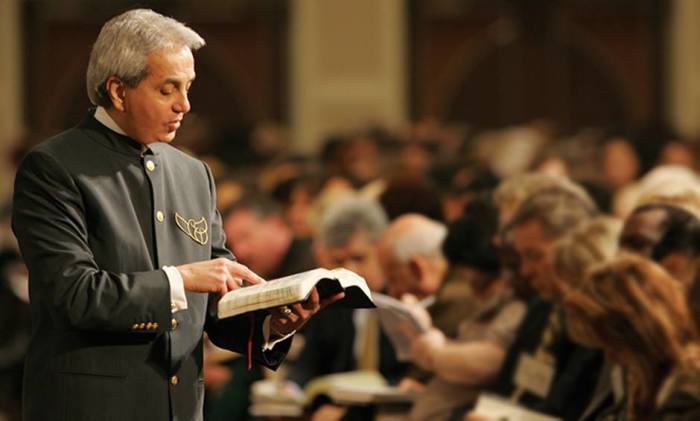Does teaching 'prosperity gospel' make pastors false teachers?: Bible scholars debate (part 2)

Christian leaders from differing theological backgrounds weighed in on the complexities of Christian television and the controversial prosperity gospel as part of a larger discussion about the critical role of discernment in ministry.
In a four-hour roundtable discussion, Justin Peters, leader of Justin Peters Ministries, and Jim Osman, author and pastor of Kootenai Community Church, discussed the issue with Michael Brown, host of the "Line of Fire" podcast, and Sam Storms, pastor emeritus of Bridgeway Church in Oklahoma City. Read part 1 of their discussion here.
One of the key points raised was the nature of Christian television networks like Trinity Broadcasting Network and Daystar, with Osman noting, "All it is, is a simple function of supply and demand. ... Whatever the demand is, that's what they're going to supply."
"You don't see expositors. … The reason that Word Faith, NAR dominates Christian television is because that's what the demand is. If there was a demand for exposition, you would see expositors. There's no demand for that; the demand is for all of this garbage," he said.
This observation sparked a broader reflection on the state of the theologically "weak" American Church, with concerns expressed about its depth across various denominations, not just within charismatic circles.
"Justin and I lament the weak state of the church across the board in America, absolutely," Osman said.
The prosperity gospel, with its focus on wealth and health as signs of faith, was unanimously criticized. However, the discussion highlighted the diversity of beliefs within the charismatic movement, with Storms noting "varying shades of the prosperity message."
"It's not monolithic," he said. "There are individuals who place a great deal of emphasis on generosity. And they take things that Paul said about how God will provide you with seed for sowing, and they misunderstand that it's so that you can give more, not that you can keep it for yourself, but they still are finding texts that they think supports it. And yet, at the same time, if you sat across from them and you said, 'What would you tell an unregenerate person how to be saved?' And if they said anything other than repent of your sins and trust in the sufficiency of Christ's life, death and resurrection, then we have a real problem. I don't think they would say, 'You need to do all that and, by the way, if you just take out your checkbook and donate to my ministry, it'll help you a little bit in God's sight.'"
However, Peters pointed out, "Anytime you say salvation is by grace through faith in Christ plus something, whatever follows that plus gets all of the attention."
"The Gospel gets lost, whatever follows that plus gets all the attention, and the Gospel gets lost," he said.
Osman agreed that the prosperity message "overshadows and adds" to the Gospel message.
"You talked about principles of generosity and principles of prosperity; you mentioned both of those," he said, speaking to Brown. "You combined them really quickly, but I see them as two entirely different things. I would not have any issue with Randy Alcorn teaching the prospect the issues of generosity. The Hobby Lobby guys have been generous. The Chick-fil-A founders have been generous. There are people to whom God gives tremendous wealth so that they can give generously to the Lord's work. … That's not what Benny Hinn does."
"The minute it begins to creep into the message itself, it becomes the means and the end. It overshadows the Gospel, in which case, then we're saying false teacher, and I need to know nothing else," he added.
The leaders shared concern over the potential for deception and harm posed by false teachings and stressed the importance of grounding Christian faith and practice in sound doctrine. Yet, they also called for grace and patience in dealing with theological disagreements.
"What Michael and I are trying to say is we see a bit more nuance. We see varying shades of commitment to [the] so-called prosperity message, those who cross a line — and maybe we're not even capable of writing, drawing the line on this table. Those who do cross the line in such a way that it compromises, undermines the centrality and the supremacy of Christ in His saving work, yes, [that's a] false teacher," Storms said.
A significant portion of the dialogue centered on Christian leaders' responsibility to discern and address false teachings. While there was consensus on the necessity of confronting theological errors, Brown and Storms cautioned against quick labeling of individuals as false teachers.
"So if the message that you come away with is, 'This guy preaches prosperity,' that's not the Gospel, 100% not the Gospel, dangerous, misleading, heretical, etc.," Brown said. "If part of a message of equipping the Body in certain ways is teaching principles of generosity, that's what they're known for, but they're clear, and they're evangelists, and they're clear what the Gospel is, then I would not put them in that camp."
"So, I think [what] we're just going to come down to is, we're going to be slower to make that final, false teacher thing, even though we say that's definitely a dangerous teaching," he added.
The conversation concluded with an appeal for greater discernment and responsibility among Christian leaders and media consumers.
"We each have our reasons for it," Brown said, urging the Christian community to critically evaluate the teachings they encounter and to uphold the Gospel's centrality in all forms of ministry.
"If any man preaches any other Gospel to you than what I preach, let him be a curse,'" Osman said, quoting Galatians 1:8. "That, I think, is a broad brush, and that's the brush that I'm willing to paint with."
Leah M. Klett is a reporter for The Christian Post. She can be reached at: leah.klett@christianpost.com




























